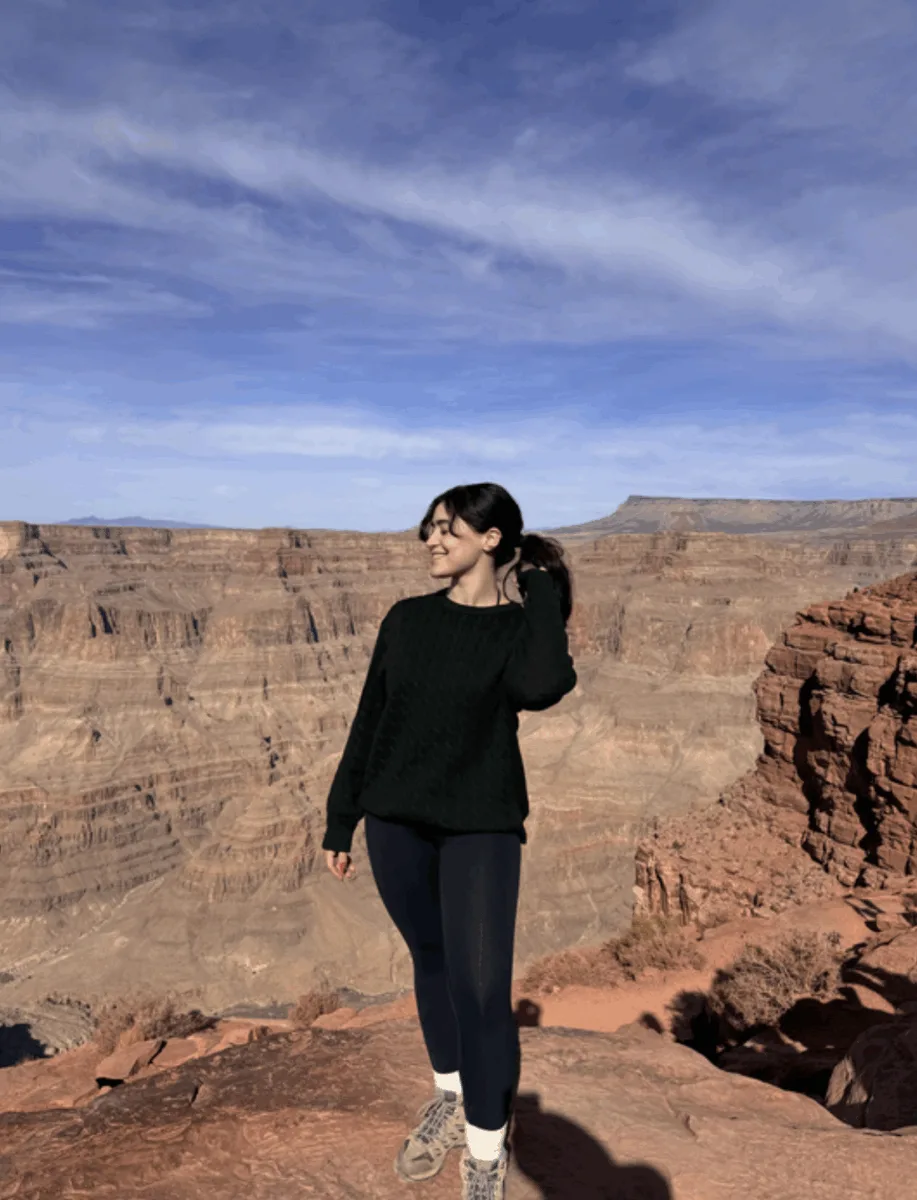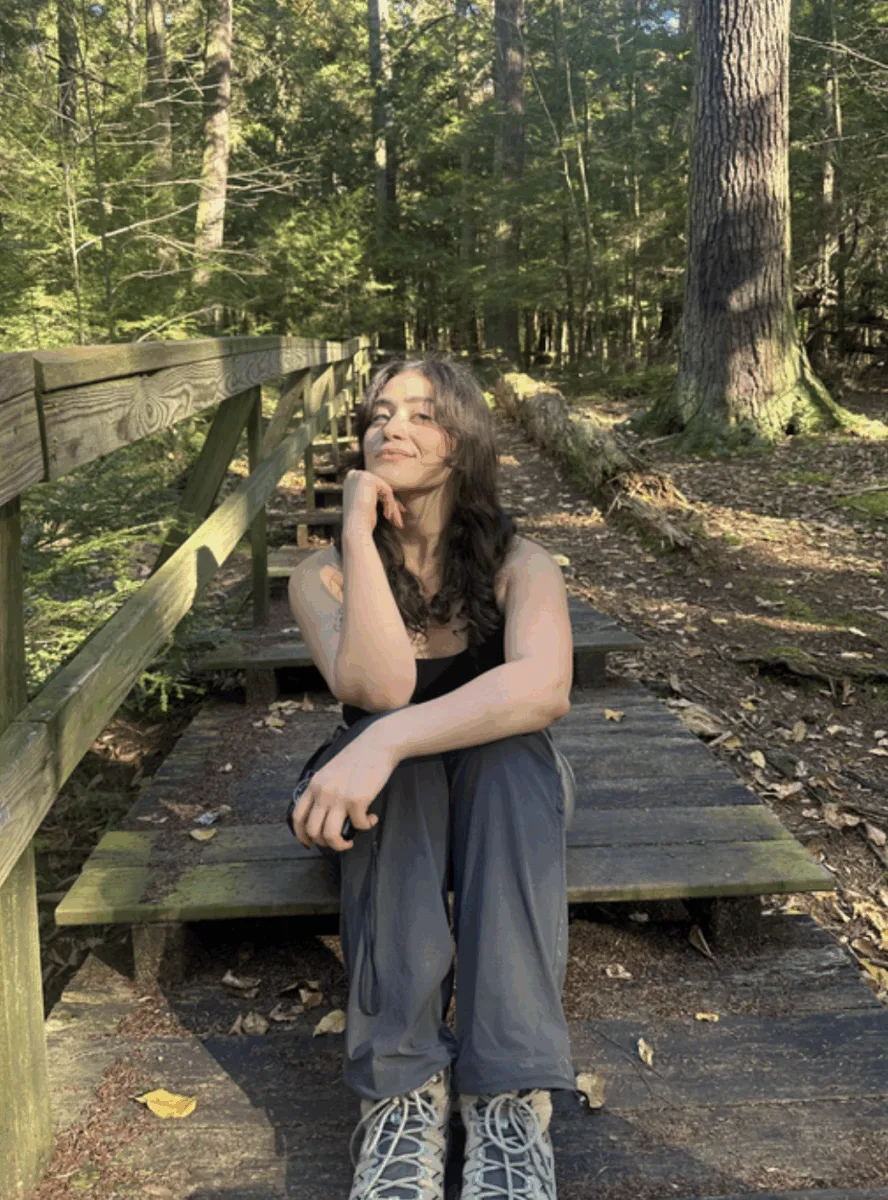

This summer we’re introducing interns from Student Career, RESESS, and Geo-Launchpad programs to highlight their research projects and how EarthScope programs further their career goals.
Nini Markhvashvili is one of EarthScope’s Summer 2025 RESESS interns. She is a recent graduate of Binghamton University, graduating with a degree in Environmental Geology. She is currently studying station data to observe crustal structures in the Alaska region.
To learn more about Nini, read the Q&A below!
Q&A with Nini
VM: Hello everyone. My name is Viridis Miranda, I’m a Science Communication intern at EarthScope, and I’ll be interviewing here Nini Markhvashvili. How are you, Nini?
NM: I’m good. How are you?
VM: Doing good and excited to be interviewing you today. So Nini, could you tell us a little bit about what your internship position is, and what you like most about it?
NM: Right now, I’m at the University of South Carolina in Columbia, South Carolina. My work is definitely more on the geophysics side, specifically seismology, and it’s all computer-based.
I’ve been working with earthquake and station data, focusing on the Alaska region. The goal is to understand how the crust behaves beneath Alaska and how the crust affects seismic waves, and also to figure out how those crustal structures might be distorting our measurements of deeper parts of the Earth. So it’s a lot of coding. I use Python and I use Shell scripting. I meet with my mentor bi-weekly, and those meetings are very helpful, because he walks me through the theory behind what we’re doing, and then he helps me to plot diagrams. I didn’t really have any coding background going into this, so the first couple of weeks were catching up with the most basic geophysical concepts and slowly getting comfortable with coding. I did take an Intro to Geophysics class in school, but I pretty much did not remember anything from it.
I always wanted to get into coding, but I never really had the chance before. I used to think that I would start learning through free courses online or YouTube during my last semester of university, but I was just too overwhelmed with classwork. So this summer has been a very, very cool and new experience, because I finally have a chance to dive into the computer world, writing code, debugging, and seeing how things come together. And it’s such a serotonin boost and a very rewarding experience because you work on a code and then suddenly there’s this beautiful, visually appealing diagram sitting in front of you. So very rewarding. Also, I’m planning to submit my AGU [American Geophysical Union] abstract today, and I’ve never been to a conference before, so I’m excited to visit New Orleans this fall and see how people present their work, and also I will get a chance to share mine as well.
VM: Would you be presenting in a poster or in an oral presentation?
NM: Poster.
VM: That’s amazing. Posters are interactive and that’s very good to break the ice amongst other researchers and other students as well. What other seismic instruments are you using in order to retrieve this data and then complement it with coding?
NM: I don’t have hands-on experience with any seismic equipment. We get our data downloaded from IRIS and process that through Python. I’m using a Jupyter notebook to do that, so I don’t have hands-on experience with any equipment.
VM: Oh, no need to worry. For my graduate research. I deal with Apollo seismic data. So the Apollo lunar data was from 1969 to 1977 and I also download the seismic data from IRIS, which is pretty amazing. What would you say is the most fun out of learning Python, learning in a Jupyter notebook?
NM: I would say, as I said before, you write a bunch of words, and then you just see this beautiful diagram in front of you, and it makes you understand the theoretical concepts behind it much easier, because I’m a visual learner. So then when I see the diagram, I know actually what’s going on.
VM: That’s awesome. And you mentioned that you were doing a lot of classwork your last undergraduate year. Are you a recent undergraduate?
NM: I actually graduated this past winter from Binghamton University [New York] with a degree in Environmental Geology. I actually started off as a chemistry major, but I had no idea what I actually wanted to do with it. I took an intro geology course to fill a requirement at Binghamton University, and it was called “Earthquakes and Volcanoes.” I talked to my professor after class one day, and he explained how many different directions you could go in with a geology degree. So I just spontaneously changed my major to geology.
VM: Geology is one of those degrees that’s pretty interdisciplinary, you can do a lot with it, especially right now with machine learning, Python, and programming being so relevant. It’s really cool that you’re picking up programming alongside geoscience. Any plans for grad school?
NM: Seismology is a lot of fun, but in school, my favorite classes were hydrology and geochemistry. This internship definitely made me realize that I need to work on grasping computer languages, because if I end up doing hydrology, hydrologists use a lot of Python and GIS for modeling. So this internship definitely made me realize that I want to go to grad school. I want to do a degree in hydroinformatics and water management, basically study hydrology with a lot of computer modeling involved, so that way I can build a stronger foundation in Python and GIS, and then get into the workforce after.
VM: Awesome. That’s a very strong plan that you’ll be going into hydrogeology and GIS. And the skills you’ve learned from Jupyter Notebook and Python can transfer into that graduate degree as well. So all the skills that you’re using right now, you can carry into water management and water resources, so that’s pretty cool.
NM: Yeah, definitely. This is the first step I had to take to inspire myself to go to grad school. I was too intimidated to do any degree, especially a master’s, that involved coding. So this was my first step, and I’m really happy and grateful that I did it. I was pretty intimidated to use any kind of coding language before this, and that was setting me back from applying to grad school and even considering it. So taking this first step, I’m very confident now that I want to continue my studies with a master’s degree.
VM: That’s awesome. What advice would you give to other students who want to pursue a graduate degree similar to yours?
NM: Don’t be afraid to ask questions, even if they feel repetitive or stupid. I’ve asked the same things multiple times, whether it was with my mentor during this internship or my professors in school. Honestly, most people I’ve interacted with are just happy to help and are very patient. So that would be my number one advice. Also, be open to stepping outside your comfort zone. Before I switched to geology, I wasn’t very outgoing or spontaneous at all. But I’d stay after classes to ask my favorite professors questions, just out of curiosity, and because I genuinely enjoyed chatting with them, because they were such cool and interesting people. Those small things led me to experiences that I never imagined, like spending a summer in Puerto Rico for field camp, for example. I hiked through the entire island, tropical areas, mountains, mapping rocks. I had no idea what I was doing when I first changed my major to geology. I just followed what felt exciting in the moment, and then ended up here, and I have no regrets.
VM: That’s amazing. So you were doing the field camp course in Puerto Rico?
NM: Yes, for six weeks. It was in Mayagüez.
VM: That’s where my campus is!
NM: Really? I would go to that campus every morning–for six weeks!
VM: That’s super amazing! And Puerto Rico, the good thing about it is, if you want to see sedimentary, karst, you go to the north and south. If you want to see igneous and metamorphic rocks, they’re in the southwest side of the island, and some parts of the east you see these nice batholiths, these igneous intrusions. We don’t have to travel very far!
NM: It’s such variety over such small distances! You can go from one extreme to another extreme in five hours, or less. That’s why I’m just so glad that I did it, because I got exposed to every kind of environment. Geologically, Puerto Rico is a perfect place, I think.
VM: Thank you. It’s my home, and I truly love it here. I’m so glad that someone like yourself–because you seem like a pretty cool person–that you got to study the island of Puerto Rico.
NM: It’s such a good coincidence! My first semester, I couldn’t wait to show what I did. I went back this summer right before this internship, because I stayed at my friend’s place, she’s from Puerto Rico.
VM: Now you have another contact here in Puerto Rico! So, one of my last questions: what other hobbies or extracurriculars do you have?
NM: I’m really into weightlifting, and I’ve been doing it for 3 to 4 years. But Columbia [South Carolina] where I’m at at the moment isn’t a very walkable city, unfortunately, and I don’t drive, so I had to take a break from it this summer. I also play piano, classical music, but I haven’t been able to do that either, so I picked up reading this summer. I normally don’t read many books, I would prefer watching a movie. This summer, my apartment complex has a pool, so I’ve been reading in the evenings by the pool, and just trying to enjoy a slower pace. It’s been very therapeutic, actually.
VM: That’s awesome. Finding ways to destress after a long day is important. Always remember to give yourself some grace.

